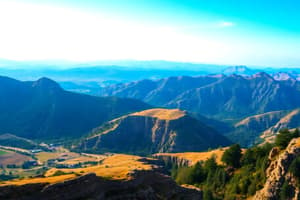Podcast
Questions and Answers
What is the primary focus of physical geography?
What is the primary focus of physical geography?
- Cultural practices and urban development
- Human activities and their effects on the environment
- The political structures of different regions
- Natural features and processes of the Earth (correct)
What type of geography examines the distribution of populations and urban development?
What type of geography examines the distribution of populations and urban development?
- Physical Geography
- Human Geography (correct)
- Meteorological Geography
- Climatological Geography
Which of the following best describes absolute location?
Which of the following best describes absolute location?
- The cultural significance of a location
- The relationship of one place to another
- Precise coordinates such as latitude and longitude (correct)
- General area defined by common features
What is the main purpose of GIS in geography?
What is the main purpose of GIS in geography?
Which trend in geography emphasizes sustainability and environmental issues?
Which trend in geography emphasizes sustainability and environmental issues?
Flashcards are hidden until you start studying
Study Notes
Definition of Geography
- Study of the Earth's landscapes, environments, and the relationships between people and their environments.
- Involves both physical and human aspects.
Branches of Geography
-
Physical Geography
- Focuses on natural features and processes.
- Includes landforms, climate, ecosystems, and biogeography.
-
Human Geography
- Examines human activities and their impact on the world.
- Topics include culture, economy, urban development, and population distribution.
-
Geographical Techniques
- Use of tools and methods like GIS (Geographic Information Systems), remote sensing, and cartography.
Key Concepts
-
Location
- Absolute location: precise coordinates (latitude and longitude).
- Relative location: position in relation to other places.
-
Place
- Describes the physical and cultural characteristics of a location.
-
Region
- Areas defined by common features (physical, cultural, political).
- Types: formal (uniform), functional (nodal), and vernacular (perceptual).
-
Movement
- The mobility of people, goods, and ideas across the planet.
-
Human-Environment Interaction
- Examines how humans adapt to and modify their environment.
Tools and Technologies
-
Maps
- Various types: topographic, thematic, political, etc.
-
GIS
- Software for mapping and analyzing spatial data.
-
Remote Sensing
- Collecting data from satellites or aircraft to analyze the Earth’s surface.
Important Concepts
-
Scale
- The relationship between distance on a map and the actual distance on the ground.
-
Spatial Analysis
- Investigating the arrangement of phenomena across the Earth's surface.
-
Cartography
- The art and science of map-making.
Current Trends in Geography
- Increased focus on sustainability and environmental issues.
- Use of technology in mapping and spatial analysis.
- Globalization and its impact on cultural and economic geography.
Definition of Geography
- Geography examines the Earth's landscapes, environments, and the interactions between people and their surroundings.
- Encompasses both physical (natural features) and human (societal influences) aspects.
Branches of Geography
- Physical Geography
- Explores natural phenomena such as landforms, climate, ecosystems, and biogeography.
- Human Geography
- Investigates human activities, including cultural practices, economic systems, urban development, and population distribution.
- Geographical Techniques
- Involves tools like Geographic Information Systems (GIS), remote sensing technology, and cartography for analysis and representation.
Key Concepts
- Location
- Absolute location is defined by specific coordinates (latitude and longitude).
- Relative location refers to a location's position in relation to other areas.
- Place
- Encompasses both the physical attributes and cultural characteristics of an area.
- Region
- Defined by common features: formal (uniform characteristics), functional (linked by activity), and vernacular (perceived characteristics).
- Movement
- Focuses on the flow of people, goods, and ideas worldwide.
- Human-Environment Interaction
- Studies how humans adapt to and change their environment.
Tools and Technologies
- Maps
- Diverse types include topographic (relief representation), thematic (specific themes), and political (boundaries and governance).
- GIS
- Software system designed for mapping and analyzing spatial data effectively.
- Remote Sensing
- Involves gathering data from satellites or aircraft for Earth surface analysis.
Important Concepts
- Scale
- Represents the relationship between map distances and actual geographic distances.
- Spatial Analysis
- Investigates the distribution and arrangement of phenomena across various landscapes.
- Cartography
- Combines the art and science of creating maps, crucial for geographic representation.
Current Trends in Geography
- Heightened emphasis on sustainability and environmental challenges.
- Increased integration of technology for mapping and spatial analysis.
- Examination of globalization's effects on cultural and economic landscapes.
Studying That Suits You
Use AI to generate personalized quizzes and flashcards to suit your learning preferences.




